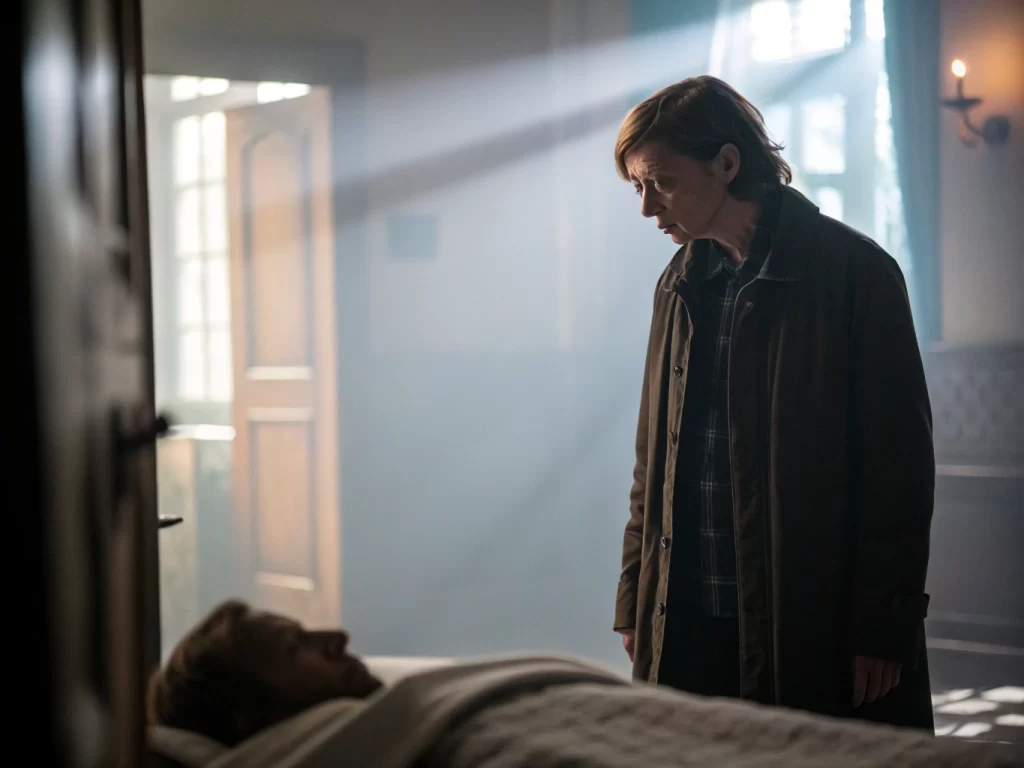What It Means to See a Loved One Deceased in Dream?
Aryan K | January 13, 2025

When you dream of a deceased loved one, it’s natural to wonder what it means. Are these dreams random, or do they have a deeper significance? In this article, we delve into the meanings behind a deceased loved one in a dream and how these dreams can influence your emotions and help you process grief.
Key Takeaways
Dreams of deceased loved ones can aid in processing grief, offering comfort and helping individuals confront unresolved emotions.
Common themes in these dreams include visitation dreams for comfort, message dreams for closure, and distressing dreams highlighting unresolved guilt.
Understanding and coping with these dreams through journaling, self-care, and professional help can facilitate emotional healing and provide clarity.
Dreams of Deceased Loved Ones: An Overview
Dreaming about deceased loved ones can be a powerful way to process grief and the emotional void left by their loss. These dreams often serve as a bridge between the conscious and subconscious mind, allowing us to confront the complex emotions associated with a loved one’s death. They can evoke a mix of feelings, from comfort and peace to sadness and longing, reflecting the multifaceted nature of grief.
These dreams often serve as meaningful experiences that aid in navigating grief in real life. They provide opportunities to reconnect with lost loved ones, offering solace and sometimes even closure. A dream gave a sense of peace during this process.
Visitation dreams offering comfort or distressing dreams highlighting unresolved feelings both play vital roles in emotional and psychological healing.
Common Themes in Dreams About Deceased Loved Ones
Dreams involving deceased loved ones are common, with around 60% of individuals experiencing such dreams at some point in their lives. These dreams can evoke a wide range of emotions, from comfort and reassurance to distress and sorrow. They often reflect unresolved emotional issues or stages of the grieving process, serving as a mirror to our innermost feelings.
There are several recurring themes in these dreams, each with its own significance. From visitation dreams that bring a sense of peace to distressing nightmares that signal unresolved guilt, these themes provide valuable insights into our emotional state. Recognizing these dream types can aid in navigating grief and discovering paths to healing.
Visitation Dreams
Visitation dreams, where a deceased loved one appears, can be uniquely comforting and incredibly vivid, leaving a strong impression of their presence. For instance, one might dream of a departed grandfather, seeing him healthy and happy, perhaps wearing a familiar outfit that evokes fond memories.
Visitation dreams are often seen as spiritual connections, conveying messages of comfort or guidance from the afterlife, especially during significant life transitions in daily life when emotional support is most needed.
The comfort and reassurance from these dreams are crucial in the healing process, making the dreamer feel less alone in their grief.
Dreams Where the Deceased Is Alive
Dreams in which a deceased loved one appears alive can be emotionally charged, often reflecting ongoing grief or unresolved feelings as the dreamer confronts the finality of death. Seeing a loved one alive again, even in a dream, can bring a mix of comfort and confusion, highlighting the deep emotional impact of their loss.
These dreams may relate to the stages of grief identified by Dr. Elisabeth Kübler-Ross, including denial, anger, bargaining, depression, and acceptance. Dreaming of a loved one as if they never passed away helps in processing these complex emotions related to a loved one’s death.
Message Dreams
Message dreams involve deceased loved ones conveying specific guidance. These dreams can be deeply meaningful, offering closure or direction. For instance, dreaming of saying goodbye to a deceased loved one can bring a profound sense of peace and finality.
These dreams often allow the subconscious mind to process unresolved issues. Messages received can provide clarity and hope, aiding in emotional understanding and grief navigation.
Distressing Dreams
Distressing dreams involving deceased loved ones often signal unresolved emotions such as guilt or sorrow. These intense nightmares reflect the dreamer’s inner turmoil and unresolved issues related to the loss. For instance, a dream in which the dreamer feels they failed their loved one in some way can be a manifestation of lingering guilt.
These dreams starkly remind us of unresolved emotional conflicts from the loved one’s waking life, emphasizing the need to confront and resolve these feelings for emotional healing.
Past Memories Dreams
Dreams revisiting past interactions with deceased loved ones often reflect a desire to reconnect emotionally, reliving cherished moments or significant events for comfort and closure. For example, dreaming of a family gathering where the loved one is present can evoke a flood of emotions and memories.
These dreams can highlight unresolved feelings, helping the dreamer confront emotions not fully processed during the loved one’s life. Revisiting past interactions can bring peace and closure, crucial in the grieving process.
Psychological and Emotional Interpretations
Dreams about deceased loved ones carry deep psychological and emotional significance, reflecting the complex nature of grief and surfacing a wide range of emotions that need careful attention. These dreams offer insights into the dreamer’s emotional state, revealing hidden aspects of their grief and longing for connection.
Understanding the psychological and emotional impact of these dreams is essential for navigating the grieving process. Whether bringing comfort and reassurance or highlighting unresolved issues, these dreams play a crucial role in emotional well-being. Learning to interpret and cope with them can lead to healing and emotional balance.
Processing Grief
Dreams of deceased loved ones naturally occur during the grieving process, reflecting the complex emotions of loss. They can indicate personal growth and healing, aiding in understanding and navigating grief. For some, these dreams help maintain a connection with departed loved ones, providing comfort and continuity.
If grief becomes overwhelming, seeking professional therapy can provide valuable support. A grief therapist can help develop coping strategies and offer a safe space to explore the emotions triggered by these dreams. By addressing these feelings, individuals can find closure and continue their healing journey.
Unresolved Issues
Dreams that reflect past interactions with deceased loved ones can highlight unresolved issues and emotions. These dreams often bring to the surface lingering feelings that need to be addressed for emotional closure. Revisiting these interactions in dreams helps individuals confront unresolved feelings and find a way to move forward.
Keeping a dream journal clarifies feelings and identifies recurring themes. Writing down and reflecting on dreams can provide insights into emotional states and help develop strategies to address unresolved issues.
Emotional Support and Healing
Dreams of deceased loved ones offer significant emotional support, facilitating healing and creating a sense of comfort, helping individuals feel less alone in their grief. After experiencing such dreams, many people report a lingering sense of their loved one’s presence, which can be deeply reassuring.
Self-care practices are vital for maintaining emotional balance during grief. Journaling, mindfulness techniques, and regular physical activity support emotional well-being and aid in navigating grief. Practicing self-care helps individuals find the strength to continue their healing journey.
Spiritual and Cultural Perspectives
Dreams of deceased loved ones often hold significant spiritual and cultural meanings, with many cultures believing they signify a spiritual connection where the deceased communicate with the living. These beliefs provide comfort and a sense of continuity, aiding in navigating grief.
Understanding these spiritual and cultural interpretations adds meaning to the dreams, offering a different perspective on grieving. Recognizing the spiritual significance of these dreams helps individuals find solace and a deeper connection to their loved ones.
Spiritual Connections
Many cultures believe spirits of the deceased connect with the living through dreams, providing comfort or closure. These visitation dreams offer opportunities to receive guidance, insights, or wisdom relevant to the dreamer’s life.
In various spiritual traditions, dreaming of a dead person may indicate that the individual has not yet transitioned to the afterlife or is reaching out to offer support. Understanding these spiritual connections helps individuals find comfort and peace in their dreams.
Cultural Beliefs
Different cultures possess unique beliefs and practices regarding the dreams of deceased loved ones. Many traditions view these dreams as significant spiritual events, reflecting beliefs about life after death. For instance, in Cambodian culture, dreams of the dead are seen as indicators of whether the deceased has achieved rebirth, with specific rituals performed to facilitate this process.
These cultural beliefs offer comfort and closure to the bereaved, affirming connections to the deceased. Understanding and honoring these cultural perspectives helps individuals find solace and a deeper connection to their loved ones.
Coping with Dreams About Deceased Loved Ones

Dreams of deceased loved ones evoke a range of emotions, from comfort to distress. Understanding and implementing coping strategies is crucial for managing these feelings and navigating the complex emotions these dreams uncover.
Coping with these dreams ensures they become a source of healing rather than distress. Journaling, self-care practices, and seeking professional help are various ways to manage emotions triggered by these nocturnal experiences.
Journaling
Journaling is a valuable strategy for processing dreams about deceased loved ones. Writing down and reflecting on dreams helps uncover hidden meanings and navigate the emotional landscape.
This practice aids in understanding feelings and finding clarity, promoting personal growth and healing. Overall, journaling is an essential tool for processing and making sense of dreams involving deceased loved ones.
Self-Care Practices
Practicing self-care is crucial for maintaining emotional well-being during grief. Activities promoting relaxation and mental health help manage emotions associated with dreams of deceased loved ones. From mindfulness techniques to regular physical activity, self-care practices support overall mental health and contribute to the healing process.
Prioritizing self-care helps individuals find the strength to navigate their grief and emotional challenges.
Seeking Professional Help
If dreams about deceased loved ones become overwhelming, seeking professional help is crucial. A therapist or counselor can offer valuable support, helping individuals develop coping strategies and navigate their emotions.
Finding the right mental health professional significantly aids in managing grief and emotions triggered by these dreams. Inquiring about the therapist’s training and background in grief ensures individuals receive the necessary support.
Summary
Dreams about deceased loved ones are a profound part of the grieving process, offering insights into our emotional state and helping us navigate the complex emotions associated with loss. From visitation dreams that provide comfort to distressing dreams that highlight unresolved feelings, these nocturnal experiences play a crucial role in our journey toward healing. Understanding the psychological, emotional, and spiritual significance of these dreams can provide a deeper connection to our lost loved ones and aid in our personal growth.
By implementing coping strategies such as journaling, engaging in self-care practices, and seeking professional help when needed, individuals can manage the emotions triggered by these dreams and find a path to emotional balance and healing. Embracing the spiritual and cultural perspectives can also provide comfort and a sense of continuity, helping us honor and maintain our connections with the departed. Ultimately, these dreams remind us that our loved ones continue to live on in our hearts and memories, offering us guidance and support from beyond.
Frequently Asked Questions
Why do I dream about deceased loved ones?
Dreaming about deceased loved ones often serves as a way to process grief and unresolved emotions, providing both comfort and closure. It’s a natural part of healing from loss.
What are visitation dreams?
Visitation dreams involve experiencing the presence of deceased loved ones, often conveying messages or a sense of comfort. These dreams are typically very vivid and meaningful to the dreamer.
How can I cope with distressing dreams about deceased loved ones?
To cope with distressing dreams about deceased loved ones, consider journaling your feelings, engaging in self-care, and seeking professional help if the dreams become too overwhelming. Taking these steps can provide you with comfort and clarity during this challenging time.
Do dreams about deceased loved ones have spiritual significance?
Dreams about deceased loved ones often carry spiritual significance, providing a sense of connection and potentially offering guidance and comfort from those who have passed.
Should I seek therapy if I frequently dream about deceased loved ones?
If dreaming about deceased loved ones causes you distress or interferes with your daily life, seeking therapy can provide support and help you process these feelings. It’s important to prioritize your mental well-being.
Recent Posts

Everything You Need to Know About Ophiuchus—the 13th Zodiac Sign
Olivia Marie Rose | April 16, 2025

Master the Magic 8 Ball: Accurate Answers and Fun Predictions
Aryan K | April 16, 2025

Good Friday 2025: An Ultimate Guide to Celebrating This Holy Day
Aryan K | April 15, 2025

Hitler’s Birth Chart Exposed: What the Stars Really Say
Olivia Marie Rose | April 15, 2025

Characteristics and Traits of July 13: Discovering the Sign of Cancer
Aryan K | April 15, 2025
Topics
- 4 Digit Angel Numbers
- 5 Digit Angel Numbers
- 6 Digit Angel Numbers
- Astrology and Birth Charts
- Business Astrology
- Career Astrology
- Celebrities and Personalities Astrological Profile
- Children Astrology
- Chinese Astrology
- Different Angel Numbers Meaning
- Double Digit Angel Numbers
- Dreams Interpretation
- Festivals
- Finance Astrology
- Find Baby Names
- Find Best Astrologers
- Gemstones and Birthstones
- Janam Kundli Chart
- Love Astrology
- Marriage Prediction Astrology
- Nakshatra (Constellations)
- Numerology
- Pet Astrology
- Rudraksha Beads
- Single Digit Angel Numbers
- Spirit Animals
- Spirituality and Positivity
- Stars, Planets and Cosmic
- Symbolism
- Tarot Cards
- Triple Digit Angel Numbers
- Understanding Hinduism
- Vastu Shastra
- Vedic Astrology
- Western Astrology
- Yoga and Meditation
- Zodiac Sign Date Calendar
- Zodiac Signs
- Zodiac Signs Compatibility
